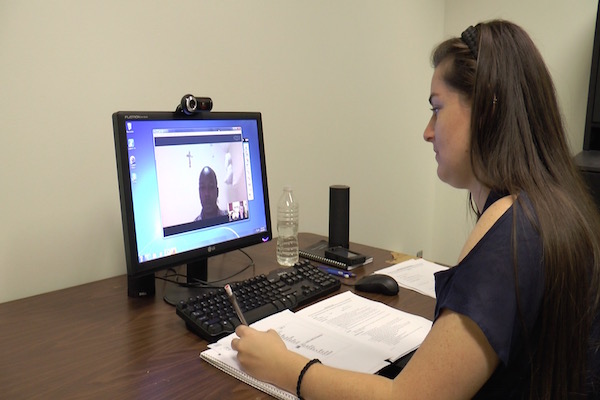FAU Unlocking the Voices of People Who Stutter in Rwanda
Florida Atlantic University is unlocking the voices of people who stutter in Rwanda by providing free speech therapy using video conferencing calls.

FAU graduate student Shaye Drake uses Skype to deliver free speech therapy to her client in Africa.
Florida Atlantic University is unlocking the voices of people who stutter in Rwanda by providing free speech therapy using video conferencing calls. FAU is the first university to provide tele-therapy with patients in Africa.
Stuttering is a communication disorder marked by involuntary word repetitions, prolongations, or abnormal stoppages of sounds or syllables. According to the African Stuttering Research Center (ASRC), there is just one therapist for every 37,483 people who stutter in Africa.
During a trip to Kigali, Rwanda in 2009, Dale Williams, Ph.D., a professor in the Department of Communication Sciences and Disorders at FAU, attended several meetings about the development of a Distance Therapy Program with Rwanda. In 2010, the ASRC contacted Williams about the program, and a partnership was born.
After years of gathering names, conducting evaluations, and working out logistics, the Department welcomed its first patient in February 2014.
“The treatment is perfect for me and helping me to improve my speech,” said Francois, a 35 year old currently receiving therapy. “It’s also easy to take part in since I don’t need to move. We are using Skype video calls and sharing documents through email.”
FAU graduate students administer the therapy every Thursday at 11:30 a.m. Each session lasts 50 minutes and is supervised by a certified and licensed speech-language pathologist.
“The university is a training facility, and this program gives our students the opportunity to do stuttering therapy, distance therapy, and interact with a different culture,” said Williams. “Our students love working with Rwandans. I think they get more out of it than they put in.”
Williams, who stutters himself, hopes the Distance Therapy Program not only improves patients’ speech, but also heals the negative emotions caused by stuttering.
“People view stuttering as a one-second pause in speech, but that’s just the tip of the iceberg,” said Williams. “There is a lot of shame, embarrassment, and even secondary behaviors that go with it, and I wanted to help people through that.”
-FAU-
Tags: graduate college | students | education | faculty and staff | technology